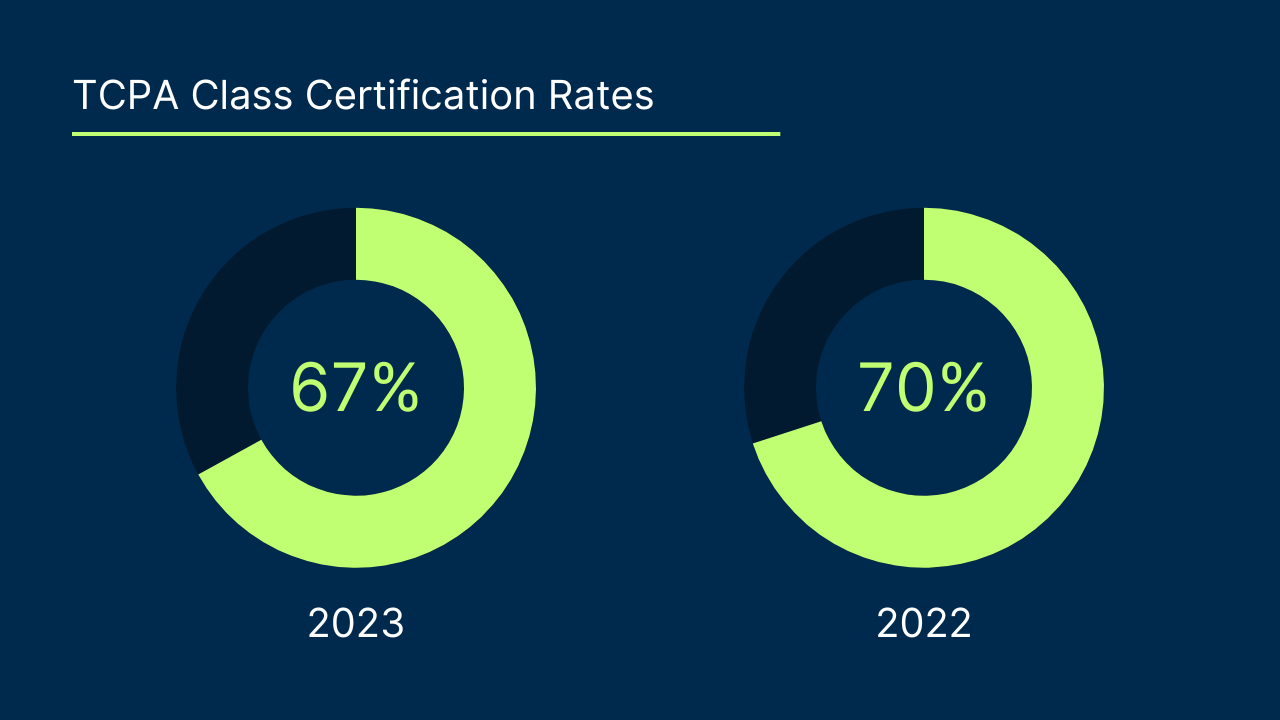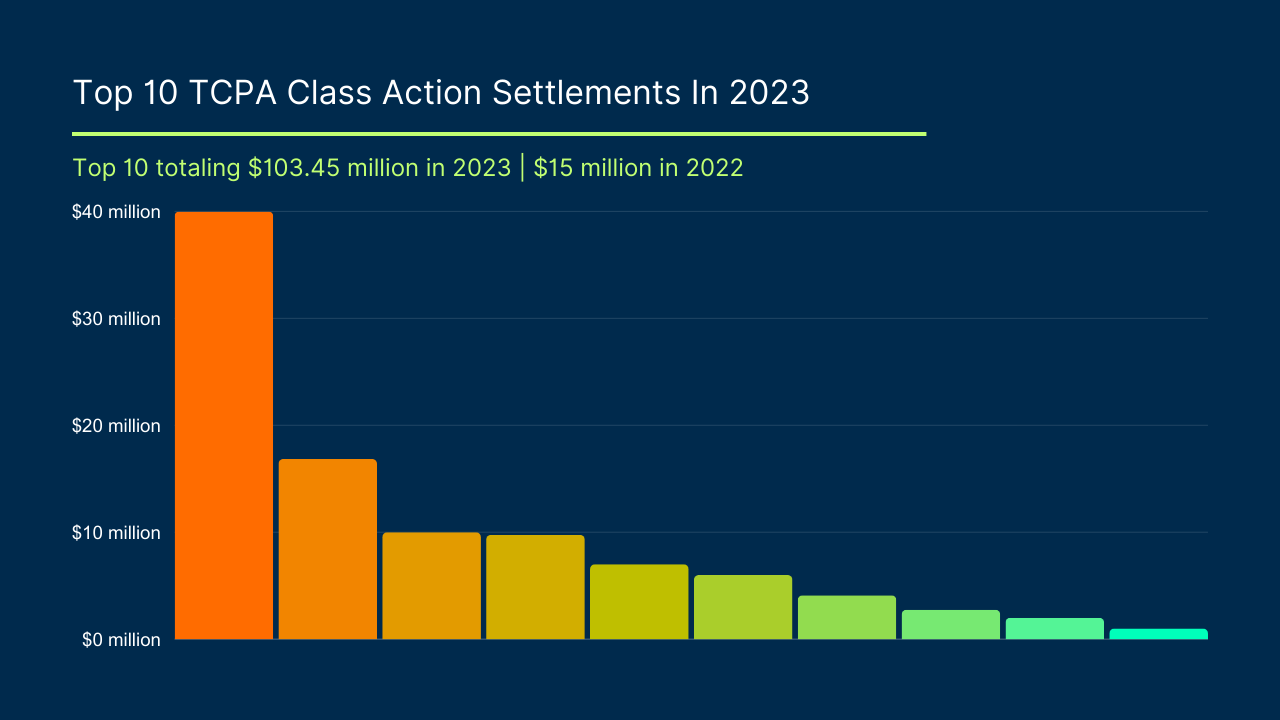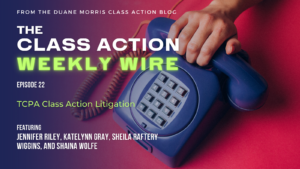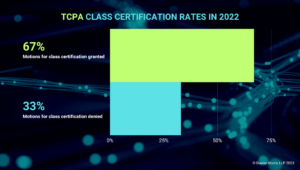 By Gerald L. Maatman, Jr., Jennifer A. Riley, Emilee Crowther, and Zachary J. McCormack
By Gerald L. Maatman, Jr., Jennifer A. Riley, Emilee Crowther, and Zachary J. McCormack
Duane Morris Takeaways: In Drazen v. Pinto, No. 21-10199, 2024 U.S. App. 2024 LEXIS 11590 (11th Cir. May 13, 2024), the Eleventh Circuit vacated a district court’s final approval of a settlement of a class action alleging GoDaddy, Inc. violated the Telephone Consumer Protection Act (“TCPA”) by sending unwanted marketing texts and phone calls through a prohibited automatic telephone dialing system (“ATDS”). The Eleventh Circuit held the district court abused its discretion by approving the class-wide settlement, which would have provided up to $35 million to pay class members’ claims and up to $10.5 million to class counsel in attorneys’ fees. The Eleventh Circuit opined that the district court erred by overlooking evidence of collusion between class counsel and GoDaddy’s attorneys.
The Eleventh Circuit concluded that the district court inappropriately certified the class, and should not have approved the proposed settlement agreement and granted class counsel’s motion for attorneys’ fees. In doing so, the district court overlooked evidence of collusion between class counsel and GoDaddy’s attorneys, treated the settlement as a common fund instead of a claims-made resulution, and improperly calculated attorney fees after erroneously concluding it was not a coupon settlement. The Eleventh Circuit remanded the case back to the district court for further proceedings.
The Eleventh Circuit’s 123-page opinion offers a treasure trove of insights regarding the need for constant vigilance when it comes to TCPA compliance — particularly for employers involved in these types of class actions.
Case Background
GoDaddy, Inc., a publicly traded multi-billion-dollar U.S. corporation, provides services – including domain registration, website hosting, payment processing, and marketing support – to entrepreneurs around the globe. Id. at *2. The Drazen litigation consisted of three consolidated TCPA class action lawsuits brought against GoDaddy alleging the company sent unwanted marketing texts and phone calls through ATDS. Id. at *13. The parties eventually negotiated a settlement agreement where GoDaddy would provide up to $35 million to pay class members’ claims and up to $10.5 million to class counsel in attorneys’ fees. Id. at *41. The plaintiffs moved the district court to certify a Rule 23(b)(3) class for settlement purposes, to preliminarily approve the negotiated settlement agreement, and to approve the draft notice of proposed settlement to class members. Id. at *21. The district court granted preliminary approval of the settlement and directed that notice of the proposed settlement be given to the class. Id. at *22.
Shortly after counsel emailed the notice to the class, the Supreme Court granted certiorari in Facebook, Inc. v. Duguid, 592 U.S. 395, 401-02 (2021), which took up the same principal issue in the plaintiffs’ consolidated actions: whether a device must have certain capabilities to constitute an auto dialer under the TCPA. Class counsel, anticipating an impending Supreme Court ruling in Facebook that could impact a settlement, urged the district court to enter a final judgment approving the settlement and grant its attorneys’ fees motion. Id. at *7.
The district court granted class counsel’s motion over the objection of Juan Pinto, an individual class member, who argued (i) the district court prematurely ruled on attorneys’ fees before the deadline for objections, and (ii) the fees awarded were far in excess of what class members would receive, making the settlement unfair, unreasonable, and inadequate. Id. at *8. Over the objections of this individual class member, the district court approved the settlement, and Juan Pinto appealed. Id. at *9.
The Eleventh Circuit’s Decision
The Eleventh Circuit concluded the district court abused its discretion in approving the class-wide settlement agreement. Among other oversight, the district court failed to account for the 2018 amendments to Rule 23(e)(2), it overlooked evidence indicating that the settlement agreement was the product of collusion, and that the notice of the proposed settlement failed to inform the absent class members of the claims, issues, or defenses in plaintiff’s cases as required by Rule 23(c)(2)(B)(iii), fundamental due process, and the district court’s fiduciary obligation to the absent class members. Id. at *9. The Eleventh Circuit highlighted various errors committed by the district court in its 123-page opinion, but focused primarily on three areas.
First, the Eleventh Circuit concluded that it was improper for the district court to determine the settlement as fair, reasonable, and adequate without considering Rule 23(e)(2)(A). Id. at *59. The district court also overlooked evidence indicating that the settlement agreement was the product of collusion, such as the overbroad, sweeping release provision and inadequate relief provided to the class relative to what class counsel and GoDaddy received. Id. at *60. Rule 23 and due process require that, in finalizing a class settlement, the parties and the district court must give absent class members a meaningful opportunity to opt-out or challenge the class settlement. Id. at * 66.
Second, the Eleventh Circuit determined that the notice of the proposed settlement failed to inform the absent class members of the “claims, issues, or defenses” in the plaintiffs’ cases as required by Rule 23(c)(2)(B)(iii), fundamental due process, and the district court’s fiduciary obligation to the absent class members. Id. at *71. The Eleventh Circuit adopted the interpretation of Rule 23(c)(2)(B)(iii) as “conjunctive”, and that class members must be informed not only of the claims asserted, but also of the dispositive issue in Facebook and how its decision would affect the case. Id. at *77. The Eleventh Circuit’s opinion further suggested that additional notice should have been provided regarding this development.
Third, the Eleventh Circuit found that the district court erred in three ways when it calculated attorney’s fees considering it: (1) misapplied Rule 23(h), (2) treated the settlement as a common fund when it was claims-made, and (3) determined that this was not a settlement involving coupons under the Class Action Fairness Act (“CAFA”) and thus declined to examine class counsel’s motion for attorney’s fees with CAFA-mandated scrutiny and procedures. Id. at *9. First, the district court failed to give absent class members advance notice of class counsel’s fee motion, which disregarded the manifest intent of Rule 23(h). Id. at *79. The schedule proposed by the parties and adopted by the district court provided class members with only 7 days to review the attorney’s fees motion before the objection deadline, and the notice did not specify when that motion would be filed, which the Eleventh Circuit strongly criticized. Id. at *80. Second, although labeled a “common fund,” the settlement really involved a “claims made” structure where class counsel may recover the full amount of the attorneys’ fees sought; the class members, however, recover only if they submit claims. Id. at *79. Finally, the district court declined to apply class CAFA-mandated scrutiny and procedures, which was an error as the settlement allowed the class members to choose a cash award instead of a voucher. Id. at *89.
For these reasons, the Eleventh Circuit vacated the judgment, and remanded to the district court for further proceedings.
Implications Of The Decision
The Eleventh Circuit’s opinion depicts the latest legal developments in the constantly changing TCPA landscape, and the need to structure class settlement agreements in a way that obtains peace and withstands judicial scrutiny. In an effort to avoid expensive repercussions, employers and corporate counsel must exercise caution when drafting settlement documents in class-wide resolutions. Corporate counsel should take note of the dangers of the TCPA, as well as the potential pitfalls in faulty class action settlement agreements, and continue to monitor this space for future developments.








